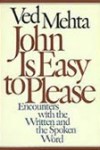
John Is Easy to Please
The six pieces collected here for the first time have been chosen by Ved Mehta from a decade of reportorial work forThe New Yorker. “They reflect, in different ways, he writes in the foreword, “the worlds in which I feel at home: India, where I was born and brought up; the United States and Britain, where I have lived since I was fifteen; and what Milton called ‘the olive grove of Academe,’ where I spent an interlude of almost nine years. The pieces are united by the ancient theme of the tongue and the pen. . . .” Among the literate personages Mr. Mehta writes about are the U.N. interpreter George Sherry (“A Second Voice”); the English editor and broadcaster Sir William Haley (“The Third”); the Oxford bookman Sir Basil Blackwell (“Quiet, Beneficent Things”); the Urdu translator and critic Ram Babu Saksena (“There Is No Telling”); the Indian novelist R. K. Narayan (“The Train Had Just Arrived at Malgudi Station”); and the American linguist Noam Chomsky (“John Is Easy to Please”).
These men and many of their confreres who appear in the book “might well be surprised to find themselves in the same room,” Mr. Mehta writes. “They would have difficulty in understanding one another’s manners, attitudes, and, in some cases, language. The gathering would indeed be a bizarre one . . . but for me it would be Heaven.” Mr. Mehta combines the literary exuberance of the true writer with the intellectual rigor of the true scholar; his style is marked by wit and sweep and fire. Since he joined the staff of The New Yorker, he has established himself as one of the magazine’s most imposing figures, and in this book about encounters with virtuosos of the written and the spoken word he has made a delightful addition to the pleasures of literacy.